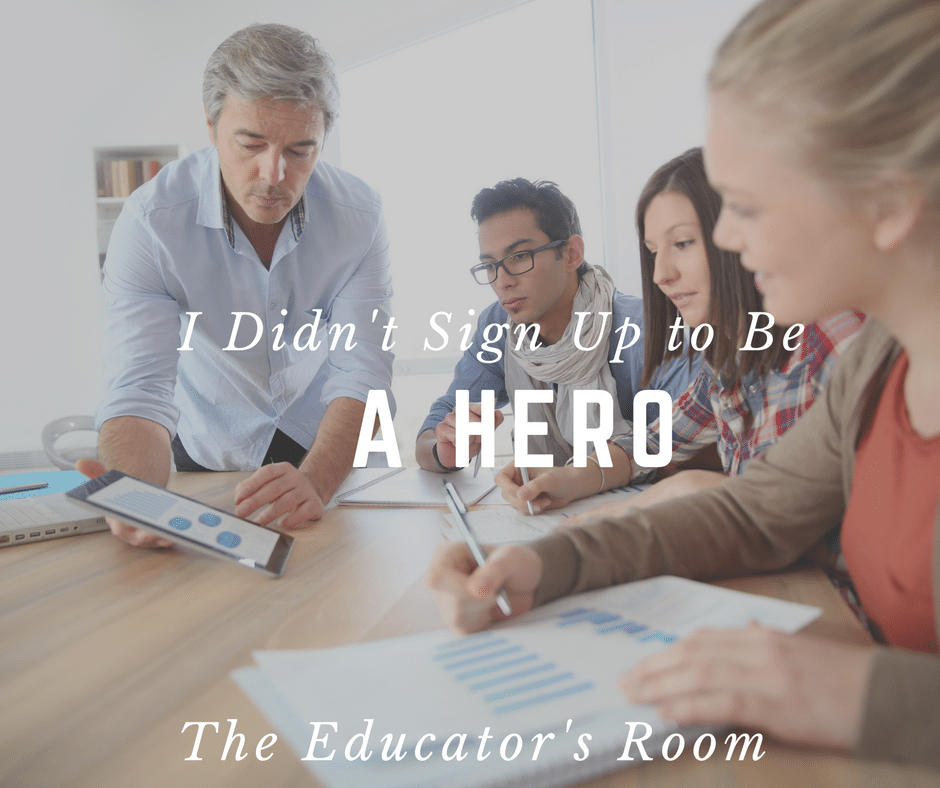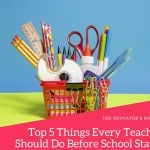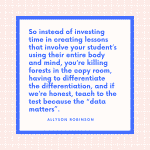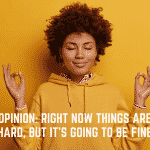I did not sign up to be a hero. No, that was not part of my plan. At least, not in the way that most people think of heroes. When most of us think of heroes, we think of warriors or people who put their lives on the line on a regular to protect others against a threat. Heroes include members of the military, firefighters, and police officers. Lately, this has extended to include teachers, including the geography teacher, Scott Beigel, who died saving students in Florida this past week.
What is a Hero?
The first definition of a hero is “a person noted for courageous acts or nobility of character,” while the second definition is someone who is “regarded as a role model or ideal.” As a teacher, technically, I did sign up to be a hero. However, I feel like I signed up to be “noble of character” and a “role model,” but not someone who did something exceptionally brave.
Even before I became a hero by default, I always believed that teachers were heroes. As a kid, I had teachers that I looked up to, and I know that I have students who look up to me as well. I remember my teachers working tirelessly to help students. In addition to helping students learn more information about academics, it was customary for my teachers to make sure students felt safe during the day. Teachers threw themselves into their work and made a difference in the world by helping to educate the next generation, teaching them how to think critically, how to read, write, and even about what makes up a cell.
So when did things change? When did teachers having to theoretically lay their “lives on the shield” become a job requirement?
I also want to make it very clear that, in this article, I am not going to be debating gun control laws. There are many articles that address that topic with more knowledge about guns and gun laws than I have. What I do have is the honest reaction of a teacher to the deaths of children and the deaths of teachers who stepped in harm’s way to protect their students.
Why Did I Become a Teacher?
As cliché as it sounds, I became an educator for the same reason that many of us do. We wanted to make a difference. I believe strongly in the power of knowledge. Knowledge is, as School House Rock taught me, power. A 2014 article by Sanjay Tripathi for Important India outlined why education is important. To me, the idea of helping create citizens who are “cultured, wise, tolerant, and public-spirited…” while also “bringing out the best in the student, not stifling their mind,” is crucial.
That’s why I do what I do. I want my students to be thinking about the world around them. I want my students to be able to think critically about a wide variety of sources and be able to write and talk about their ideas in a coherent way. A 2017 article by Glenn Geher laid out the skills that he wants to help his students learn: starting from respect, teamwork, and the ability to work hard. I want to make a difference in the lives of my students, and I feel blessed to watch my students grow and learn every year.
What Happened in Parkland, Florida?
On Wednesday, February 14th, 2018, seventeen people were killed at Marjory Stoneman Douglas High School in the city of Parkland, Florida. Seven of the victims were fourteen, two were fifteen, three were educators, one was sixteen, three were seventeen, and one was eighteen. These young people were robbed of their futures before they had even had a chance to begin.
The gunman was a former student, so he was aware of the loopholes in the school’s security. He chose a time when doors were unlocked at the end of the day. To draw students out into the hallway and “dismantle the safety system,” he pulled the fire alarm.
Students left their classrooms to follow fire safety protocol, and the gunman, whose name I am choosing to not mention, began to fire on the students. According to an article in the New York Times, the gunman was able to drop his weaponry and blend in with the other students. Later that day, he was arrested.
An article from Daily Wire gave some sobering statistics. Thirty-seven percent of school shooters show this tendency in their journals and other assignments, while fifty percent offer a sort of warning signal. As a teacher, how do I filter through the hundreds of essays that I receive and know which is legitimate? Personally, I just assume that they are all legitimate and pass them off to the proper authorities.
This whole situation, as tragic and senseless as it is, has to lead to a discussion among teachers about our responsibility to our students. It also leads to a new wave of a conversation that we have been having in the United States for quite a while. This is the idea of arming teachers.
Arming Teachers?
Teachers have always worn many hats, and now it seems like many people are suggesting that we add another. As I was researching for this article, I read a wide variety of articles on improving school safety. Most of them related to the idea of arming teachers. Some of them were in favor of this idea.
One article in the National Review argued that it wouldn’t need to be every teacher, just some of them. The author, Robert Verbruggen, points out that, for many states, completing the training required to become an armed guard was “something a teacher could easily accomplish during summer vacation.” While this might be true, it is important to remember that summers are also used for professional development and organizing classrooms. It would be awful to think about firearms training is just a part of the professional development routine.
Other articles, some written by teachers, took a very hard line against arming teachers. Some teachers worry about arming all teachers, wondering how the teachers who were able to carry would be selected. Another question that I saw frequently was this. If I, as the teacher, am involved in finding and ending a threat, who is taking care of the kids in my classroom?
There are just as many arguments for arming teachers as against it. Teachers suggest that those who have a permit can carry, while others argue that this could just escalate the situation. A helpful resource was on Wallet Hub, sharing the opinions of experts on both sides.
How Do I View My Job?
When I hear the debates about arming teachers, I get a little passionate in my opposition. I do not feel comfortable with the idea of being armed in my classroom. There are a few reasons for this. First, my hands shake when I get nervous. Secondly, and most importantly, what if a former student was the one shooting? What if the shooter was a student’s parent? And what if, horror of horrors, I thought that I was defending my class by shooting the bad guy and I was wrong?
US Secretary of Education Betsy DeVos, when asked if teachers in public school should be armed said that “this is a question and issue for communities to wrestle with,” and I can see her point. If a teacher wants to be armed, they need to have that discussion with their administration. If everyone is fine with that situation, that is between them and their district.
School shootings, however, have made this a topic that all teachers must think about. Regardless of how they personally feel about guns. In this week’s Florida shooting, at least three of the school’s educators died while protecting the students in their care. One of them was shot when he unlocked his classroom door to let a group of students in. These students were able to escape from the gunman as a result of his actions.
Hearing about these heroes made me revisit my own feelings. If it came down to it, would I step into the line of fire to protect my students? Where do I place myself during a drill?
Final Thoughts
During a recent drill, I realized that I knew the answer. The answer to this question was easier and yet harder than I had imagined. I put my students on the opposite side of the room, hidden from sight, and sat by the door. Anyone trying to get into my classroom, threatening the lives of my kids, would have to go through me. An article in the Washington Post reminded me that I’m not the only teacher that feels this way.
If it came right down to it, I would gladly take a bullet for the kids in my classroom. I would do whatever I could to keep them safe. It’s unfortunate that, in a field where I wanted to encourage peace, a love of reading, and critical thinking, that I have had to have this conversation with myself. It is a conversation that I believe most of us have had at some point, even though we might not want to.
Do I want to die in a firefight in my classroom? No, of course not. I would rather not have to worry about school shootings. I would love to live in a world where my students never have to worry about someone trying to kill them in their school. But that is not the world that we live in.
I did not sign up to be a fighter-hero; I signed up to be a teacher-hero. Today, the lines between the two are becoming blurred.







It’s not your job to become a battle combatant. It is your job to teach and educate. It is also not fair to children to be afraid for their lives everyday just by coming to school. I am on your side. Change is coming now, decades late, but we are all part of it.